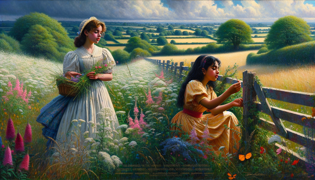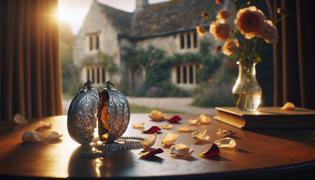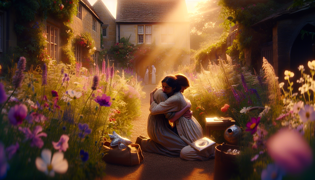The Cruel Sister: A Tale of Sibling Rivalry in the English Countryside
Reading Time: 20 min

About Story: Pretty Maid Ibronka is a from hungary set in the . This tale explores themes of and is suitable for . It offers insights. A spooky tale involving a vampire-like creature.
Introduction
On a clear morning, bright golden sunlight spilled across emerald fields, the dew on wild rose petals gleamed like tiny lanterns. A low stone wall meandered beneath a sky of pale blue, punctuated by fluffy clouds drifting lazily. It was here, in this serene English countryside, that Clara and Elise grew up. At first glance, they seemed mirror images: long hair the hue of chestnut bark, eyes the color of rain-soaked slate. Yet one sister carried a restless spirit in her gaze, a flicker of longing that belied her gentle smile. The other wore her joy openly, her laughter drifting across the hedgerows like birdsong. It was a harmony as old as memory, delicate as lace. But beneath that early promise, seeds of rivalry had begun to sprout.
Even before they could walk, the girls had felt the power of comparison. Parents would marvel at Clara’s quick wit and serious composure one moment, then praise Elise’s laughter and warmth the next. In childhood games beneath ancient oaks, Clara would study Elise with a subtle tension tightening in her chest, a longing for the soft attention Elise could command. Elise, oblivious at first, skipped through dandelion fields, her light-footed grace drawing smiles from strangers they met on muddy paths. The countryside welcomed them both, yet it offered each a stage and each a mirror, reflecting their desires back in subtle refrains of daylight and shadow.
This story is not born of darkness, nor does it wander into mythic realms. Instead it takes root in the plain soil of the heart, where love and envy can grow side by side in sunlit borders. In the days to come, those hedgerows and meadows would witness laughter, tears, and choices that would shape the sisters for years beyond the horizon. This narrative opens as the rising sun catches the dew on a single wild rose petal, a symbol more potent than any spoken vow. It heralds the moment when familiar warmth meets a chill of doubt. A moment when innocence and rivalry first collide — and the true tale of the cruel sister begins.
As a gentle breeze carried the scent of honeysuckle from garden walls, neither Clara nor Elise suspected how that same breeze might one day carry apart the chords of their childhood harmony. Yet, as light danced through budding branches, the first tremors of jealousy whispered between them, soft as the rustle of new leaves. Beneath the bright skies of that fateful season, two hearts would wrestle over a silent inheritance of affection and approval. And so we begin.
Seeds of Jealousy
From their earliest recollections, Clara and Elise shared everything except the quiet flame of comparison that glowed unseen beneath their laughter. As toddlers they chased one another across the wildflower meadow behind their cottage a few miles from the nearest village. Elise’s laughter soared above the breeze while Clara’s measured steps followed like a shadow. Even then a subtle tension flourished in Clara’s chest, curling around her ribs every time a passerby paused to marvel at Elise’s bright grin.
Family dinners at the long oak table became theaters of admiration. Their parents would commend Clara for her thoughtfulness when she arranged wild orchids in a water jug. Moments later they would beam at Elise’s carefree chatter about the song of blackbirds at dawn. Both girls sought the rare note of approval, yet the rhythm that followed Elise’s melody felt lighter, more spontaneous. In Clara’s mind that difference tasted of salt on tender skin.
It was at the midsummer festival in the nearby market town that the first solid seed of jealousy took root. A fiddler in a striped coat called for listeners to share a tune and younger children lined up to try the battered instrument passed down through his family. Elise stepped forward with ease, coaxing a melody that danced like firelight between ancient timber beams. The fiddler nodded to their parents, praising Elise’s natural talent. Clara’s own performance, careful and practiced, drew polite applause. Yet she noticed how the crowd lingered on Elise’s final chord, as though it held an unspoken promise.
In the amber glow of dusk, the sisters wandered home along a hedgerow thick with honeysuckle. Elise skipped ahead, humming with the thrill of praise. Clara trailed, counting each step, weighing every breath. She felt the cool weight of envy settle in her bones like an unwelcome guest. That evening she pressed a lock of her dark hair behind her ear and studied her reflection in the candlelit window, wondering why her own reflection felt dull against Elise’s bright flame.
School days brought new opportunities for comparison. Teachers praised Elise’s storytelling, her voice weaving images that captivated classmates. Clara excelled in mathematics and logic puzzles but found no warmth in the rigid certainty of numbers. At lunchtime, children gathered around Elise’s table, eager for the next chapter in her unfolding narrative. Clara sat alone among worn garden chairs, tracing patterns in moss on the stone wall. She envied the way Elise’s words could paint pictures of far-off places without leaving their tiny village.
At home, the garden arch became a stage. Elise wove wild roses through the lattice and Clara arranged potted herbs in neat rows. Their creations side by side spoke volumes. Visitors would marvel at the harmony of color in Elise’s roses then praise the neat order of Clara’s rosemary and thyme. Both girls understood the compliment. Both felt its sting.
By the time they reached adolescence, Clara’s longing had shaped itself into a quiet determination. She resolved that when the next moment came she would prove herself worthy of praise, even if it meant outshining her own sister. In her memory, each gesture of affection felt borrowed from her, each joyful look directed at Elise wrote itself in invisible ink upon her heart. Participants in a village art contest found two portraits hung side by side praising Elise’s light-filled depiction of the market square while Clara’s careful sketch of her sister stood unnoticed in a shadow.
And so the stage was set. Beneath the sunlit hedgerows and beneath laughter and blooms, the fragile bonds of sisterhood had begun to fray. As the days lengthened toward adulthood, both Clara and Elise would stand at the edge of that unfolding gulf. The seeds of jealousy sown in youth would grow, ready to burst into thorned blooms when the crisis finally came. Theirs was a story not yet at its final act but already alive with the charged electricity of impending conflict.

The Broken Heirloom
Under the pale light of an early autumn afternoon, the family gathered in the parlour to celebrate their grandmother’s ninetieth birthday. The room was painted a soft saffron hue by the low golden sun that filtered through lace curtains. On a table near the fireplace, crystal vases held sprays of heath and rosehips, framing a carefully wrapped box tied with a faded ribbon. Clara watched Elise unwrap the gift with a flutter of excitement, her own pulse echoing in her ears. When Elise revealed the delicate silver locket—an heirloom passed down through generations—Clara felt an unexpected twist in her chest.
The locket was engraved with intricate vines and tiny blossoms that seemed to dance across its surface. Their mother leaned close and whispered that the piece once belonged to their grandmother’s mother and would now belong to Elise. A ripple of applause rose in the narrow room, warm as spilled honey. Elise traced the engraving with gentle fingers, her eyes shining like clear glass. Clara forced a smile, nodding as though she too shared in the delight. Yet beneath that polite gesture, a quiet storm gathered.
In the days that followed, the locket became the center of every conversation. Elise wore it to the church fair where she helped serve tea beneath bunting of pastel flags. She wore it to the market and to the garden gate where neighbors murmured their admiration. Sometimes Clara caught Elise holding the locket close to her heart as if to measure its worth against her own beating chest. The sight made Clara’s breath catch in her throat, hot and bitter.
One afternoon, a sudden accident fractured the fragile peace. Clara had taken the locket from Elise’s dresser to admire it by the window light. A gust of wind from the cracked sash sent the ribbon tumbling. Clara reached out to steady it, and her fingers brushed against the surface with a trembling uncertainty. The locket slipped through her grasp, clattering against the wooden floor with a dull echo. She paused, heart pounding, and saw the delicate clasp had twisted open, leaving the locket split in two halves on the rough planks.
Panic flooded Clara’s thoughts. She knelt and touched the cool metal, studying the fine crack that split the vine pattern as cleanly as a knife. She lifted one half and then the other, imagining Elise’s hurt when she discovered the damage. Time stretched. Clara could return the halves to the dresser and feign ignorance. But when Elise found the broken heirloom, the truth would emerge all the same. In that moment, Clara felt the full weight of what she had done—unintentional yet irreversible.
When Elise returned home that evening beneath a sky brushed with lavender, she found Clara waiting near the door. The air between them felt fragile, like a thin layer of ice that might shatter at any misstep. Elise’s gaze flicked to the dresser where the locket should have been and then to Clara’s downcast eyes. Without a word, Clara brought both halves into view. Elise’s expression crumbled as she reached out, her fingertips trembling at the damaged metal. A sudden silence engulfed the room, heavier than any spoken reprimand.
Their mother emerged from the kitchen, concern etched in gentle lines on her face. She knelt and took the pieces, voice soft as a prayer as she explained that the heirloom might be repaired only by a passing silversmith in a distant town. Elise’s gaze lifted to Clara, and in that look Clara saw disappointment and sorrow mix like spilled ink. Jealousy in Clara twisted with guilt. She stepped forward, hand hovering above her sister’s shoulder, but the words she wanted to say lodged in her throat.
Over the next few days, the broken locket lay on a mantle piece as a silent testament to the fracture widening between the sisters. Elise withdrew into herself, walking the garden paths at dawn, her breath visible in crisp morning air. Clara found herself trailing behind, craving a chance to make amends but unsure how to bridge the distance that had opened so suddenly. In the fading light of each evening, she practiced words of apology she could never fully say.
At the market, Elise’s bright gaze no longer found Clara among the stalls. She moved past stalls of jam jars and hessian sacks without a greeting. Clara tried to bargain for freshly baked bread with a trembling voice but found no respite in simple tasks. The world outside the hearth felt vast and indifferent, as though every corner held a reminder of what was lost. The locket remained broken, an object rendered useless by a single lapse of attention, and its metallic hollow seemed to echo the emptiness growing in Clara’s heart.
Yet within that emptiness lay the first stirrings of redemption. In the quiet moments before dawn, Clara rose to retrieve healing salve of her grandmother’s making. She carried it wrapped in linen to Elise’s window. She placed it on the sill with a folded bloom of foxglove as an unspoken offering. As the silver light of morning touched each petal, Clara felt the fragile possibility of forgiveness glimmer between them once more. And in the stillness before judgment, they both stood on the brink of a choice that would shape the course of their sisterhood.

Storm over the Moors
After weeks of icy distance, their father suggested a day trip to the moors beyond the village to clear the air. It was mid-October, and the rolling hills wore a patchwork coat of tawny grasses and russet heather. Mist curled around rocky outcrops as dawn broke in pale apricot light. Clara and Elise climbed into the old carriage, wrapped in scarves and anticipation. Neither spoke on the way, the tension between them as taut as the leather straps under the horses’ hooves.
At the top of the moor, they stepped onto rough ground where the wind carried a raw tang of peat and rain. The highwaymen of childhood tales seemed to hide behind every shadow, yet the sisters felt both thrill and unease. Elise tightened her woolen cloak, brushing damp hair from her forehead. Clara stood a few paces behind, clutching a voucher for hot broth that their mother had packed. The moor offered space for distance and reflection in equal measure, but Clara felt the air between them resonate with unfinished words.
They paused at an ancient standing stone, worn by centuries of wind and time. Elise placed a hand against the cool surface, tracing weathered runes as though seeking solace in their timeless permanence. Clara watched from the edge of the stone’s shadow. In the sudden gust that swept across the heath, their scarves whipped around them like captive birds. A single raindrop fell, then another, until a soft drizzle blurred the horizon.
Elise turned, her voice low as a distant thunder: 'Perhaps this day will heal what has been broken.' Clara felt the words as a challenge, a promise, and a threat all at once. She met her sister’s eyes, the green pools now clouded by memory and hurt. Anger flickered as sharply as lightning. Without thinking, Clara stepped forward and demanded that Elise stop speaking in riddles. Their words intertwined in swirling mist, each phrase revealing a hidden depth of jealousy and longing.
As wind and words rose to a crescendo, the first rumbles of thunder echoed across the moor. Elise’s breath caught. Clara’s heart pounded as if her ribs were drums. Then, in a sudden movement, Clara turned away and strode toward a rocky path that led higher into the heather. Behind her, Elise paused, hand pressed to her heart, torn between following and retreating. Rain began to fall in earnest, soaking the sisters through in moments. They scattered like startled birds, each seeking refuge beneath the shelter of a boulder.
Clara found a narrow ledge and pressed her back to the cold rock. Heart hammering, she struggled to catch her breath. Each drop of rain hissed against her skin, each gust of wind seemed to strip away old defenses until only raw emotion remained. She pressed her palms to her eyes and let silent tears mingle with the rain. Memories of every moment Elise had outshone her washed across Clara’s mind like a creek swelling after a storm. And in that storm of regret, clarity arrived.
Lower down the slope, Elise huddled beneath a ledge of moss-covered stone, cradling the broken silver locket in her hands. She brushed rain from her cheeks, her tears indistinguishable from the downpour. The cold seeped into her bones, and for a moment she feared the anger they shared would bind them forever apart. Yet the sight of Clara’s shaking silhouette above filled her with a fierce longing to cross the chasm between them.
Summoning courage, Elise rose and began to climb, each foothold slick with rain and tinged with risk. The stone under her fingers was smooth and unforgiving. She thought of the first summer day when they chased butterflies in the meadow, laughing without care. She thought of the tilting branches through which light had once waltzed over their hair. She thought of the locket and what it meant to her— not merely a family treasure but a symbol of shared history. When she reached Clara’s shelter, the storm seemed to still for a heartbeat.
Clara turned, surprised to see her sister soaked and determined. They met eyes, both damp and luminous. No words were needed; their hearts spoke a language beyond speech. Elise stretched out the halves of the locket toward Clara, offering forgiveness in a gesture silent yet profound. Clara reached out with trembling hands, lifting the pieces and pressing them together. The two halves did not click back into place neatly, but in that imperfect union lay the true restoration of their bond.
A final clap of thunder shook the rocks overhead, then the clouds parted enough to let a pale beam of sunlight pierce the gray canopy. It fell across the sisters’ clasped hands as though blessing their renewed accord. In that moment on the windswept moor, two hearts beat in quiet harmony once more. The storm had riled their souls but also washed away regret. Together they would return home, carrying not only the fractured heirloom but a deeper understanding of envy, love, and the fragile beauty of forgiveness.

Paths to Forgiveness
As they descended from the moors toward the familiar path home, the sisters moved side by side in a new, unspoken accord. The breeze still carried damp whispers of the storm, but the sky above was clearing, unveiling streaks of pale gold and rose. Their boots crunched over pebble-strewn earth, and each step felt lighter than it had in weeks. Without turning, Clara slipped the halves of the silver locket into Elise’s gloved palm. Elise held them gently, warmth returning to her fingertips.
They reached the gate where the garden’s foxgloves nodded in the breeze. Elise paused and faced Clara, the first hint of a soft smile touching her lips. Clara’s gaze softened in return, and she realized how harsh her own features had grown under the weight of envy. They stood for a moment amid the scattered petals and dripping leaves, two figures in a world reborn. Then Clara spoke, her voice low but steady. She spoke of fear and guilt, of the ache she had borne each time Elise smiled at the locket. She admitted how she had envied the love she saw mirrored in Elise’s eyes and how that envy had blinded her to her own blessings.
Elise listened without interruption, her own heart buoyed by Clara’s honesty. After a long pause, she placed a hand on Clara’s arm and spoke of her own mistakes. She confessed how she had let the locket become a barrier between them, and how she had forgotten that its true value lay not in its shine but in the stories it carried. She acknowledged the silent hurt that Clara must have felt when every compliment seemed to circle around her, leaving her in shadow. In the hush that followed, their words wove together like threads in a tapestry, each confession a stitch binding two souls more tightly than any metal clasp.
They reached the cottage doorstep just as dusk poured its warm glow through stained glass. Their mother emerged, concern still lingering in her soft eyes. She took each sister by the hand and led them to the fireplace where the dying embers glowed amber. Without speaking, she presented a letter she had written to a silversmith in the neighboring town. The craftsmen there possessed the skill to mend even the most delicate of antiques. Their mother’s gentle words conveyed hope: that the broken heirloom would soon be made whole again, just as she hoped her daughters’ hearts would.
That evening, the three of them sat before the hearth, wrapped in blankets and passing a mug of spiced cider between shared memories. The scent of nutmeg drifted through the parlour, mingling with the faint sweetness of burning oak. Elise placed the locket halves on a ceramic dish, ready to be wrapped and sent. Clara poured cider for both of them, her hands steady now, her gaze open and free from shadow. In the flicker of candlelight, they spoke of future plans: evenings reading by the garden lantern, walks among bluebells in spring, afternoons spent painting wildflowers side by side rather than in silent competition.
By the time the moon climbed high above the cottage roof, each sister carried a piece of peace within her. The locket still lay waiting for repair, its metal scar visible under its once-shining surface. Yet neither saw that imperfection as a flaw. Instead, it became a symbol of transformation: proof that broken things might be mended, and that love offered in humility could restore even what seemed lost forever.
Clara rose to tuck her sister in that night, pulling back the quilt to reveal Elise’s quiet smile. She pressed a final apology on her sister’s fingertips, slipping the silver halves into Elise’s palm one last time before the journey to the craftsman. Elise closed her eyes and nodded, knowing that other chapters awaited them and that the story of these sisters would no longer be one of shadowed rivalry. In the golden afterglow of forgiveness, they embraced. And in that embrace lay the promise of many tomorrows: full of shared laughter, honest conversation, and a bond stronger than any prize or heirloom.

Conclusion
In the weeks that followed, the repaired locket returned to its place of honor on Elise’s neck. The silversmith’s handiwork had left faint lines tracing the seam where the two halves once parted, lending the piece a new depth of character. Each morning, as sunlight danced across the restored metal, the sisters were reminded of the fragile beauty of second chances. They spent hours in the rose garden, weaving blossoms into hair and laughter into memory. The rivalry that once bloomed like a thorned rose had wilted under the warmth of forgiveness.
Clara discovered joy in observing Elise’s gentle spirit, feeling no sting when passersby complimented her sister’s radiant smile. She found her own passions shifting toward small moments of generosity: bringing wild daisies to neighbors, sharing fresh bread with traveling minstrels, and teaching local children how to knit soft scarves for winter. In doing so, Clara unearthed a new sense of purpose, one born from empathy rather than competition. The jealousy that once weighed on her chest melted away, leaving space for gratitude and quiet confidence.
Elise, for her part, never took Clara’s presence for granted again. She would pause mid-chapter in her storytelling to catch Clara’s eye, offering a nod of shared accomplishment. She practiced weaving ribbons through Clara’s hair on bright spring mornings and sat patiently as Clara taught her to identify the herbs growing at the fringe of the garden. Their evenings were filled with reclaimed camaraderie: hot tea by the hearth, whispered secrets under star-swept skies, and the gentle scratch of pen on paper as they began to record the memories of their childhood for future generations.
In time, their parents recognized the change blooming between the sisters. They spoke often of how the family heritage lay not solely in silver heirlooms but in the resilience of love and the grace of forgiveness. The repaired locket became more than a symbol of lineage; it stood for the lesson that broken hearts, much like broken metal, could be reforged with care, humility, and enduring hope.
And so, in the gentle steadiness of the English countryside, Clara and Elise found a deeper bond than ever before. Their story became one not of rivalry alone but of growth, redemption, and the quiet celebration of sisterly love. For beneath the boundless sky and among hedgerows heavy with bloom, they learned that the truest inheritance is the promise of forgiveness and the strength it brings to any heart willing to heal.

















